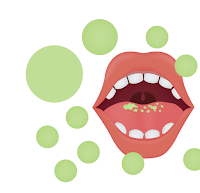Bad Breath (halitosis)
My breath gets worse throughout the day, what's going on?
Do you breath through your mouth? Do you spend most of your day speaking? This is often a common problem for people whose jobs require them to speak quite a bit. Talking or mouth breathing dries out the tissues in the mouth and makes for an ideal environment for odor-causing bacteria. You might want to carry a bottle of water with you. Frequent sips will keep your mouth moist and stimulate salivary flow.
I brush my teeth constantly, but I still have bad breath. What can I do?
Brushing and flossing are definitively the first steps to eliminating bad breath. Brushing and flossing remove bacteria responsible for creating odorous sulfur compounds and the food these bacteria feed on. However, bacteria hide not only on and around the teeth but also on the tongue under a layer of mucous. Here they are free to create odorous sulfur compounds. You might want to consider using a tongue scraper. They're extremely effective at removing this mucous layer from the back surfaces of the tongue. The latest products on the market for treating bad breath are toothpastes and mouth washes that contain chlorine dioxide. This chemical effectively neutralizes the odorous sulfur compounds, instead of simply covering up the odor.
How does sugarless gum help bad breath?
Sugarless gum stimulates your salivary glands to do what they do best - make saliva. Saliva acts as a natural mouthwash, cleansing the teeth from food particles and bacteria. Saliva also helps to dilute and dissolve some of the sulfur compound (responsible for bad breath) produced by these odor-causing bacteria.
I've noticed that my bad breath gets worse right before my menstrual period, is that right?
It's common for women to experience bad breath during the menstrual cycle. Hormonal changes make the gums more hospitable to odor causing bacteria. Basically, tiny blood vessels in the gums become more fragile in the week leading up to menstruation. When these tiny blood vessels burst, they provide an additional food source for the bacteria living in the pockets between your teeth and gums. As a byproduct of their metabolism, these bacteria produce volatile sulfur compounds (the 'bad' in the bad breath).
I keep trying new mouthwashes, do any of them work?
At best, conventional mouthwashes will mask the breath for a few minutes. Their alcohol content will actually work against you by drying out the mouth, making it more hospitable for odor-causing bacteria. You might want to consider speaking to your dentist about some of the newer products available which contain chlorine dioxide.
A friend told me that my breath smelled. Why can't I smell anything?
It's almost impossible for people to determine whether their own breath is offensive by simply blowing into cupped hands. We're acclimated to our own odors and thus unable to tell what is offensive and what's not. We often don't produce bad breath until we start talking. Talking forces air past the back of the mouth where the vast majority of bad breath is produced.
